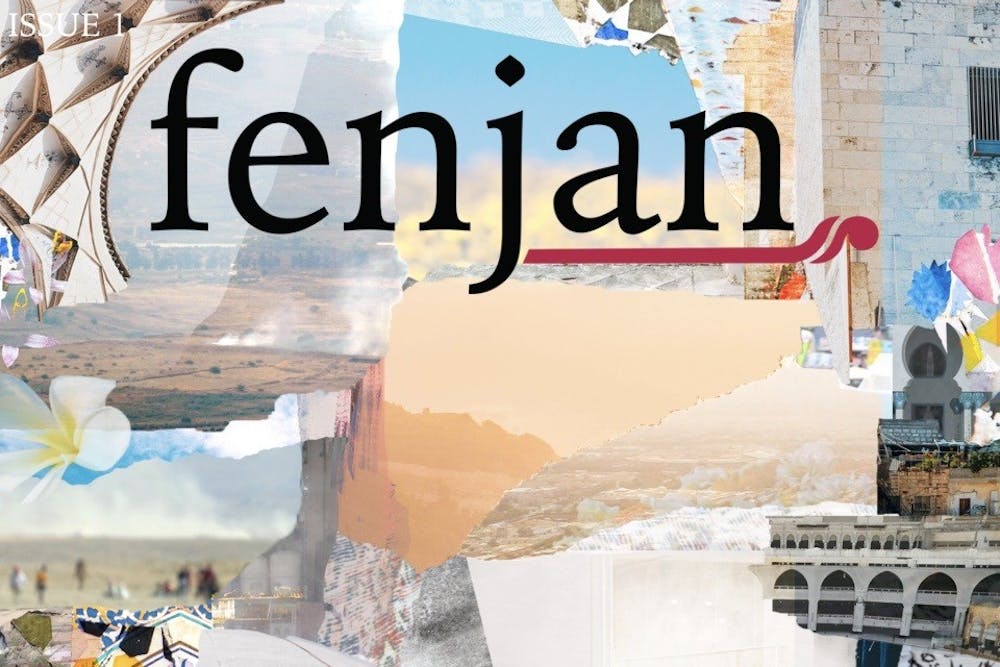
The first issue of Fenjan was published in August. (Artwork by Eleanor Shemtov)
Fenjan, Penn's first undergraduate journal on the Middle East and North Africa, officially launched this semester with its first issue exploring contemporary politics in the region.
The issue featured articles written by staff writers on topics like the humanitarian and political impact of the Beirut explosion, Black Lives Matter protests across the MENA region, and the influence of the COVID-19 pandemic in the Middle East. A second issue is set to be published on Nov. 9.
According to the Letter from the Editors published in the first issue, Fenjan's mission is “to give the Penn community a platform to engage with the MENA region—to read about, write about, and reimagine the Middle East for what it is: human."
The influence of the COVID-19 pandemic on current events is highlighted in three articles, each exploring the impact of the virus in different contexts.
College sophomore Iman Syed, who is also an audience engagement staffer for The Daily Pennsylvanian, wrote an article titled “Hajj and the Muslin World: How Coronavirus has Brought Devastation to this Billion Member Community." Syed's article outlined the pandemic's impact on the Hajj — the number of worshippers making the pilgrimage to Mecca decreased from two million to one thousand.
College junior Donya Zarrinnegar's article “A Gendered Look at COVID-19 in the MENA region” discussed the exacerbation of gendered economic disparities in the MENA region. College senior Maryanne Koussa's article “The Pandemic in Syria and Yemen: How Coronavirus is Rewriting Violence” explored the impact of the pandemic in reducing violence from foreign nations in Yemen and Syria as ceasefires were called to reduce the spread of the virus.
Despite the difficulties of launching a publication in the midst of a pandemic, the editors-in-chief of Fenjan, College sophomore Laila Shadid and College junior Zeynep Karadeniz, said that the staffers have been more involved than they had expected.
"People want to be more connected online and explore their interests, and this is a way to do that," Shadid said.
Because of Penn's remote operations this semester, Fenjan has been published solely online thus far.
College first-year Sarah Asfari read the first issue of Fenjan and said she was blown away by its beautiful design.
Fenjan has been featured on the Penn's Instagram account and in Penn Today, which has helped it to amass a greater online following. The Fenjan staff said they have used their platform not only to increase understanding of the Middle East among an international audience, but also to support humanitarian aid in the MENA region. The journal raised $1,200 in late June to benefit UNICEF’s humanitarian aid campaign in Yemen and $2,200 in August to benefit the Lebanese Red Cross after the Beirut explosion through social media fundraising campaigns.
While readership and contributors are largely Penn students, Fenjan’s submission page now states that submissions are open to undergraduate students from any university. The Fenjan staff said the upcoming fall issue will expand to feature new contributing writers and new types of content, including personal essays and opinion pieces.
“For this second issue, we just introduced contributing writers, and that’s a way to be more inclusive of the Penn community," Karadeniz said. "What we wanted to do with this issue is bring [out] more of the voices that are not necessarily covered, so we have more things on marginalized communities, on women, on different perspectives.”
The Daily Pennsylvanian is an independent, student-run newspaper. Please consider making a donation to support the coverage that shapes the University. Your generosity ensures a future of strong journalism at Penn.
Donate




